116 nations back Australia’s push for a COVID-19 inquiry
Deputy CMO Paul Kelly has said we must find out how the coronavirus started after Foreign Minister Marise Payne said she is hopeful Australia’s call for a global COVID-19 probe will pass a vote at the World Health Assembly tonight.
116 countries back coronavirus probe
10 million-plus telehealth services conducted
Australia has had 7060 confirmed cases, with 700 active cases
Invitation for meeting with China goes unanswered
Deputy Chief Medical Officer Professor Paul Kelly said he hoped the motion calling for a review of the coronavirus put an end to the international blame game about its origin and the response.
“I think the most important thing - rather than apportioning blame to one particular country or another country - is that we get to the bottom of what’s happened,” he said.
“And part of that is about the origin, where this virus came from - as we understand it, to be a zoonotic disease, spread from an animal or animals into humans - I think that’s an important component of it.”
Prof Kelly said he hoped the resolution would be successful.
“There is much that’s happened with this pandemic since the beginning and I think, looking
at the entire way that it has spread so rapidly around the world and what’s happened in different countries in the ways that different countries have approached that problem will be part of that investigation,” he said.
The inquiry motion does not mention the origins of the coronavirus, but does call on the “actions of WHO and their timelines pertaining to the COVID-19 pandemic” to be among the issues examined.
It also does not set out a specific method for an inquiry, suggesting using “existing mechanisms” for review as an option.
The review would then make recommendations to “improve global pandemic prevention, preparedness, and response capacity”.
Foreign Minister Marise Payne has also said she is hopeful the motion will pass, marking a major strategic victory for Australia.
“We’re very encouraged by the growing levels of support for the comprehensive World Health Assembly motion,” she said.
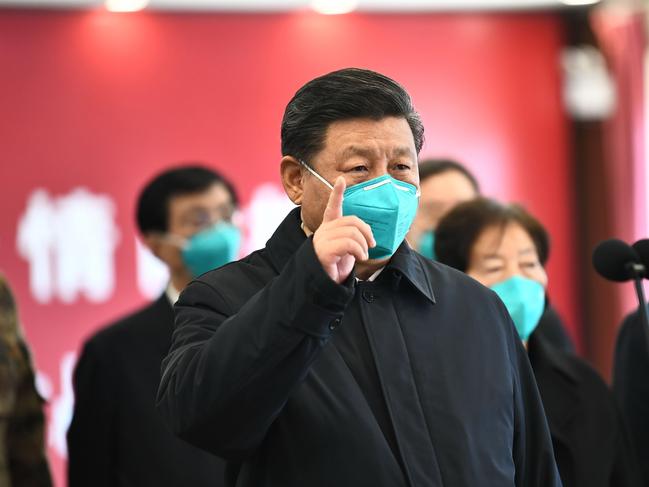
The origins of the coronavirus pandemic - including which animals it passed through before infecting humans - will be examined if the world leaders back the comprehensive draft resolution co-sponsored by Australia.
Ms Payne has confirmed the virus’ source would not escape international scrutiny, despite the wording of a motion demanding the World Health Organisation conduct a review of the coronavirus not specifically mentioning its origins.
Ms Payne said the draft resolution being put forward at the World Health Assembly by the European Union on Monday night was a “very comprehensive piece of work”.
“It sets out a whole range of steps that need to be taken in relation to COVID-19, a review amongst them, an examination of the origins of the coronavirus itself as well,” she said.
A motion in the draft resolution requests WHO director general Dr Tedros Adhanom Ghebreyesus work closely with the World Organisation for Animal Health, the Food
and Agriculture Organisation of the United Nations and countries to “identify the zoonotic source of the virus”.
The motion also requests an examination of “the route of introduction to the human population, including the possible role of intermediate hosts”.
To discover its origins WHO should conduct “scientific and collaborative field missions” to reduce the risk of COVID-19 infection in animals and humans.
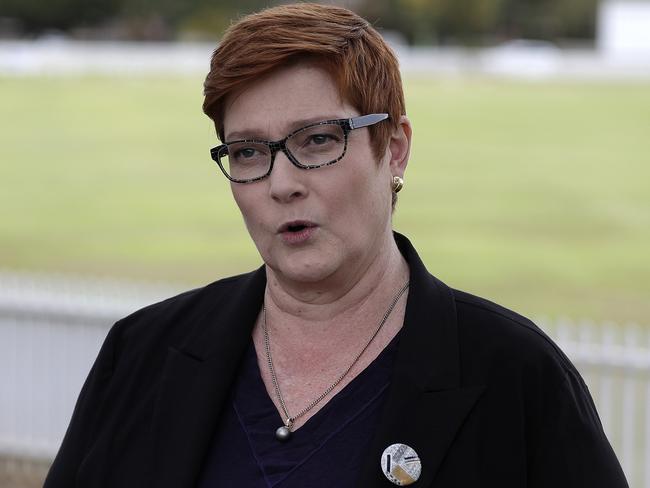
Ms Payne also revealed Australia specifically requested the international coronavirus review be described as “impartial, independent and comprehensive” in the motion drafted by the EU.
“They are three factors which we particularly have sought,” she said.
Ms Payne said she was confident the World Health Organisation had capacity to conduct the review in a way that it did not escape appropriate scrutiny itself.
“The Prime Minister and I have also discussed a number of mechanisms within the WHO, including their independent oversight advisory body, which has the capacity to do some of this work,” she said.
“But that is to be determined after the resolution is dealt with by the World Health Assembly.”
Ms Payne said Australia was “very aware” the review’s timing would depend on how other countries were coping with the pandemic.
“There are countries around the world, including some of those who have been prepared to co-sponsor or sign up to this resolution who are still dealing with some of the most difficult aspects of the response,” she said.
“They are at the peak level of the crisis, and some are yet to experience that level.
“There is a strong view that it is appropriate to engage in a review of what has happened in the pandemic, the impact it has had, to ensure basically that we learn those lessons and it doesn’t happen again.”
116 NATIONS BACK VIRUS PROBE
Their comments come after more than 100 countries have signed up to support Australia’s call for an international COVID-19 inquiry at the World Health Assembly.
The EU draft resolution now has 116 co-sponsors, after the entire African Group and it’s member states joined the initial list of 62 countries, which included Australia, Russia, the UK and Japan.
The countries now backing the inquiry are Albania, Australia, Bangladesh, Belarus, Bhutan, Brazil, Canada, Chile, Colombia, Djibouti, Dominican Republic, Ecuador, El Salvador, Guatemala, Guyana, Iceland, India, Indonesia, Japan, Jordan, Kazakhstan, Malaysia, Maldives, Mexico, Monaco, Montenegro, New Zealand, North Macedonia, Norway, Paraguay, Peru, Qatar, Republic of Korea, Republic of Moldova, Russian Federation, San Marino, Saudi Arabia, the African Group and its Member States, the European Union and its Member States, Tunisia, Turkey, Ukraine and United Kingdom of Great Britain and Northern Ireland.
The demand for an “impartial, independent and comprehensive evaluation” of the international health response to COVID-19 is expected to be the most controversial motion.
It tasks World Health Organisation director general Dr Tedros Adhanom Ghebreyesus with launching the evaluation “at the earliest appropriate moment” to review the “lessons learned” from the deadly pandemic.
The Australian government does not expect China to oppose an inquiry into the origins of coronavirus on Tuesday, senior Morrison government sources said.
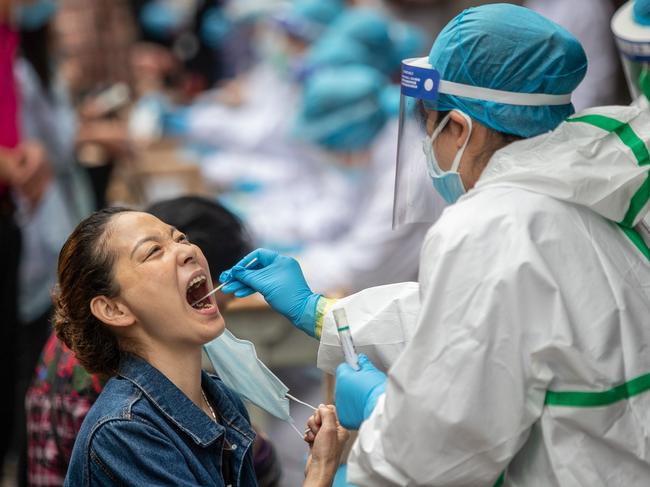
Foreign Affairs Minister Marise Payne said there was “positive support” for an independent review into the pandemic to help the world “learn the lessons necessary to protect global health”.
“This is about collaborating to equip the international community to better prevent or counter the next pandemic and keep our citizens safe,” Ms Payne said.
“Australia and a significant number of countries are co-sponsoring the EU-led resolution, which includes a call for an impartial, independent and comprehensive evaluation, to be presented at this week’s World Health Assembly meeting.”
The resolution also calls for global co-operation and collaboration to step up at “all levels” to “contain, control and mitigate the COVID-19 pandemic”.
It specifically highlights a need to provide people with “reliable and comprehensive information” about the coronavirus and measures being taken by authorities in response to the pandemic.
With conspiracy theories and fake miracle cures for COVID-19 increasingly spreading online, the resolution asks countries to counter “malicious cyber activities” peddling this misinformation.
The EU motion recognises the critical role of “extensive immunisation” against COVID-19 as a “global public good for health” once a safe, effective and affordable vaccine is available.
NEARLY SIX MILLION GET COVIDSAFE APP
About 5.8 million of an estimated 16 million Australians have registered for the federal government’s COVIDSafe tracing app since April 26.
Overseas, Britain has hired most of the 18,000 contact tracers it needs for a testing and tracking program it plans to roll out next month when lockdown restrictions are eased further.
Cabinet Office Minister Michael Gove told the BBC on Sunday that 17,200 people had been recruited, allowing the government to meet its hiring goal by next week.
The contact tracers will track down anyone who has been in close contact with those testing positive for COVID-19. They’re part of program authorities plan to launch in June, when some students will be allowed to return to school and shops can start reopening in phases. Authorities have also been testing a smartphone tracing app to help with the effort.
NSW AND QLD SPAT OVER OPENING BORDERS
Queensland’s chief health officer has thrown her support behind the decision to keep the state’s borders closed, saying coronavirus may never be eradicated. The admission comes as health officials try to contain a possible outbreak in Rockhampton.
The North Rockhampton Nursing Centre remains in lockdown after a nurse tested positive to COVID-19 on Thursday.
She had returned to work while awaiting the results and despite presenting with symptoms.
Speaking from the central Queensland town on Monday, Health Minister Steven Miles said he had ordered an independent investigation to ensure a similar incident never occurred again.
An internal inquiry is already underway.
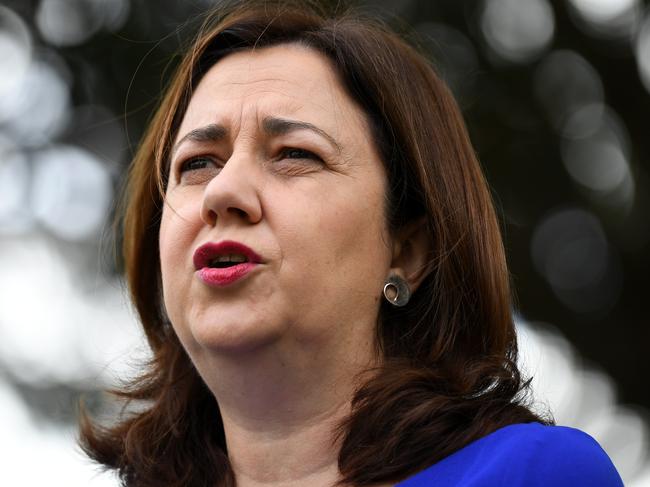
All patients and staff, except one who is on leave, have returned negative tests.
However, as a precaution, 35 residents have been temporarily relocated to nearby hospitals so those potentially exposed to the virus can have their own rooms to self-isolate.
Chief health officer Dr Jeannette Young said the outcome of the investigation would determine if the nurse was suspended.
“Since she had that confirmed result she has been extremely cooperative and has worked very closely with us and indeed agreed to a second test,” she said. Mr Miles said he was not aware of the woman’s identity and called for understanding.
“This is a real person with a real life and real feelings,” he said. “Clearly a mistake has been made. We will deal with that appropriately but I’m eager to avoid a witch-hunt.” Queensland recorded two more cases of coronavirus overnight, taking the number of active cases to 13.
The two women, from Brisbane and the Scenic Rim, had recently returned from overseas.
Of the 1057 Queenslanders who have contracted coronavirus, Dr Young said officials had not been able to trace 42 of them, including the Rockhampton nurse.
“They’re the cases that worry me,” she said.
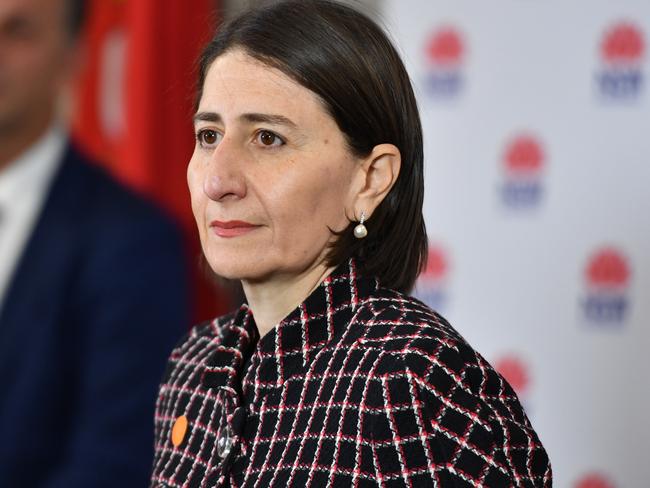
“It’s unlikely that we will ever beat this virus, we’ll have to find ways of managing it.” Dr Young said she believed borders should not reopen until other states had experienced two incubation periods without any new cases.
“The best case scenario is July, but I think that is very, very unlikely and that is what I have advised the premier,” she said.
Premier Annastacia Palaszczuk has come under attack from her NSW counterpart Gladys Berejiklian, after she told a Monday morning news program Queensland’s border may not reopen until September.
“We have to get real to the fact many parts of the world will remain closed for a long period of time,” Ms Berejiklian said.
NEW CHINESE CITY IN LOCKDOWN
Officials concerned about a virus resurgence have quarantined 8000 people and reintroduced lockdown measures in northeastern China, even as other parts of the country further relax restrictions.
Residents of Jilin, the second-largest city in Jilin Province, have been mostly barred from leaving the city, state news media reported, after a cluster of infections was reported there and in Shulan, another city under its administration. Shenyang, capital of the neighbouring province of Liaoning, said on Saturday that anyone who had travelled there from the city of Jilin since April 22 would be quarantined in a hospital for three weeks, according to the New York Times.
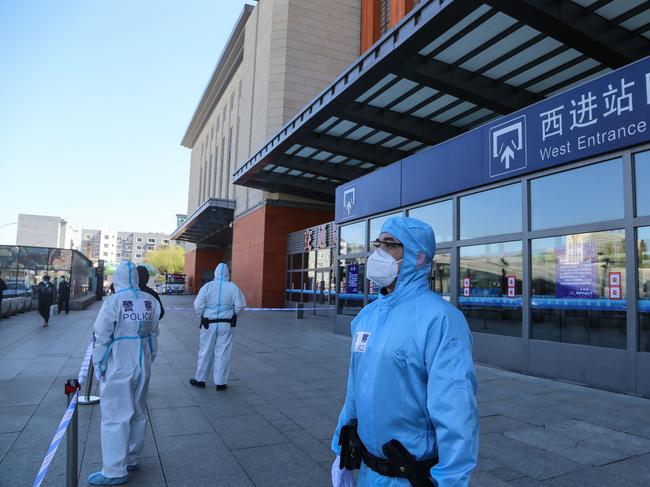
Jilin has traced nearly 700 contacts of coronavirus patients for testing and quarantine, while officials in Liaoning Province have found more than 1000 contacts and about 6500 people at high risk for infection.
China reported five new confirmed infections on Saturday local time, three of them transmitted in Jilin Province and two from overseas.
The country has reported more than 89,000 total cases and 4634 deaths.
Zhong Nanshan, a respiratory disease expert and adviser to the Chinese government, told CNN on Saturday that although China faced a “big challenge” because most of the population was still susceptible to infection.
“It’s not better than the foreign countries I think at the moment,” he said.
The Beijing Center for Disease Prevention and Control said on Sunday that it was no longer necessary to wear masks outdoors.
The Chinese capital, which has reported no new infections for 30 days, is preparing for the annual session of the National People’s Congress, a major gathering that had been postponed for more than two months.
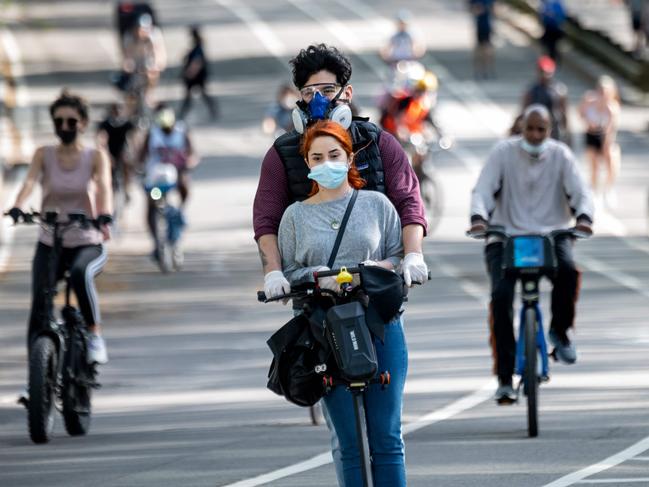
TRADE MINISTER’S INVITATION TO CHINA GOES UNANSWERED
It comes as Trade Minister Simon Birmingham tried to set up a phone call with his Chinese counterpart to sort out a growing trade rift between the two countries, but so far there has been no response.
China is threatening to slap a large tariff on Australian barley imports after it blocked beef imports from four abattoirs.
Such actions have come within weeks of Australia calling for an inquiry into the origins of the coronavirus pandemic, sparking a furious response from China.
“We’ve made a request for me to be able to have discussions with my Chinese counterpart,” Senator Birmingham told ABC television’s Insiders program on Sunday.
“That request has not been met with a call being accommodated at this stage.”
However, he said there has been lots of government-to-government communication and work continues through diplomatic levels.
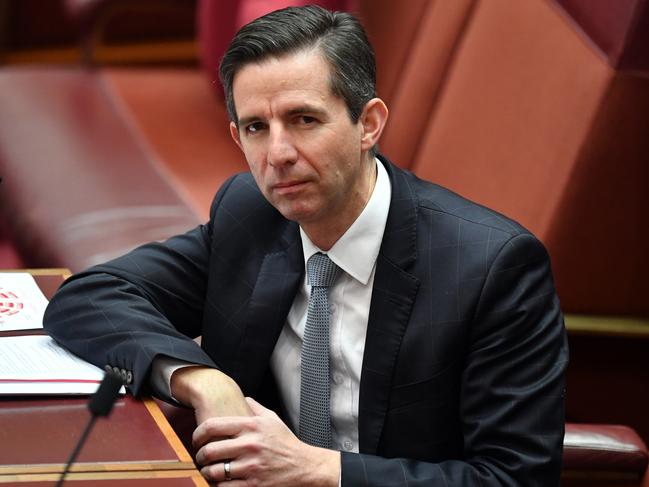
He said the government has lodged a comprehensive response to China’s 18-month investigation into barley dumping, rejecting the suggestion that the Australian industry is subsidised.
“The idea that somehow the payments that the Australian government makes to upgrade irrigation infrastructure in the Murray-Darling Basin in any way impacts on barley prices in China, just doesn’t stand the test of any analysis,” the minister said.
“Our barley that goes to China is largely a product of dry land irrigation, predominantly coming out of Western Australia and the west coast of South Australia. It’s not coming out of the irrigated areas of the Murray-Darling Basin.”
He said he may be forced to take the issue to the World Trade Organisation if China presses ahead with its threat.
Australia has used the WTO to settle disputes as an independent umpire in the past with other valued partners around the world in recent years – with Canada in relation to certain wine practices and India over sugar.
China is Australia’s number one trading partner, but Senator Birmingham said it was up to businesses to determine who they sold their goods and services to.
“I would expect that many Australian businesses off the back of some unpredictable regulatory interventions, such as those we’ve seen in the last couple of weeks, would start to consider whether the risk profile has changed and may, therefore, look at other markets,” he said.
Prime Minister Scott Morrison said the push for an independent inquiry into the COVID-19 crisis is “completely unremarkable” and Australia will stand its ground.
But China’s Foreign Minister Wang Yi has lashed out at foreign politicians for politicising the epidemic.
Former Labor trade minister Craig Emerson thought the Australian government was making a “perfectly reasonable proposition”.
“I mean, is (China) serious that we don’t want to know how the coronavirus started and got spread?” Dr Emerson told ABC television.
“It is not anti-China, it is pro-science, so that we learn about this particular virus on the assumption that at some time in the future, hopefully a long time into the future, there will be more outbreaks of different viruses.”
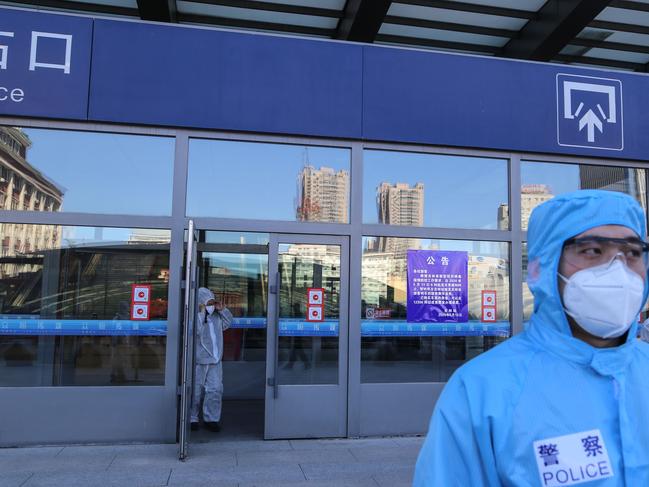
QUARANTINE-FATIGUED NEW YORKERS FLOCK TO PARKS, BEACHES
Lockdown-weary New Yorkers ditched the distancing to get social instead this weekend — transforming parts of the Big Apple as summer-like weather hit.
Outside popular bars on the Upper East Side, the Upper West Side, the East and West Villages and in Greenpoint, Brooklyn, drinkers arrived for the takeaway cocktails and sipping drinks on packed footpaths and soaking up the lively scenes.
“How are you going to drink with a mask on?” one reveler, hairdresser Akeem Kelley, told The New York Post.
His mask dangled below his chin as he stood outside the Upper East Side’s popular Dorrian’s Red Hand bar — where crowds exceeding three dozen people, nearly all unmasked, were found in the early evening on Saturday.
Yet the city’s COVID-be-damned attitude was nothing compared with the scene in Belmar, New Jersey, where huge crowds waited shoulder-to-shoulder on the boardwalk for their turn for beach access.
The crowds, which enjoyed summer-like weather that climbed to a high of 76 degrees on Saturday, apparently had forgotten that they live in the epicentre of the pandemic.
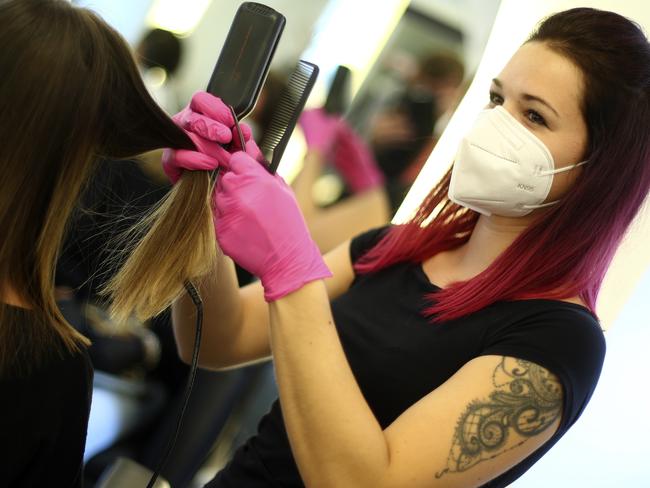
ITALY’S DEATH TOLL LOWEST SINCE MARCH
The daily death toll from the COVID-19 epidemic in Italy has fallen to 145 - the lowest since March 9 - against 153 the day before, the Civil Protection Agency says.
The daily tally of new cases fell to a March-4 low of 675 from 875 on Saturday.
The total death toll since the outbreak came to light on February 21 now stands at 31,908 the agency said, the third highest in the world after those of the United States and Britain.
The number of confirmed cases amounts to 225,435, the sixth highest global tally behind those of the United States, Spain, Britain, Russia and Brazil. People registered as currently carrying the illness fell to 68,351 from 70,187 the day before.
There were 762 people in intensive care on Sunday, down from 775 on Saturday, maintaining a long-running decline. Of those originally infected, 125,176 were declared recovered against 122,810 a day earlier.
The agency said a total of 1.933 million people had been tested for the virus as of Sunday, against 1.900 million on Saturday, out of a population of about 60 million.
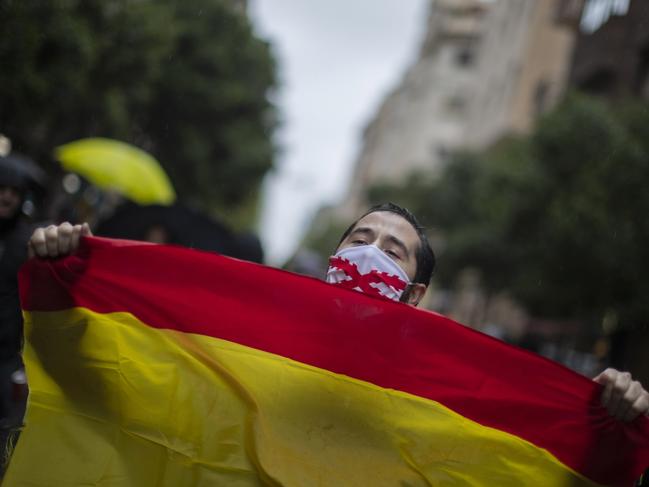
MORE NEWS
Stark image of koala rescue mission named in global awards
‘Never imagined it would last this long’
‘Like a horror story’: Father breaks silence over family tragedy
Why Powderfinger is making a comeback
SPAIN SHUTS MAKESHIFT MORGUE AFTER SLOWING VIRUS
A funeral home in Barcelona has closed a temporary morgue it had set up inside its parking garage to handle the overflow of victims of the Spanish city’s coronavirus outbreak.
The last coffin was removed and buried on Sunday, local time.
More than 3200 victims of COVID-19 passed through the temporary morgue in 53 days of use, the funeral home said.
Seeing the jump in deaths as the outbreak picked up speed in March, the funeral home run by the private company Memora said it decided to close its parking garage and condition it to safely keep the deceased inside their coffins.
“We installed refrigeration units to get the same conditions inside the funeral homes,” company spokesman Fernando Sanchez told The Associated Press.
A strict two-month lockdown by Spain has succeeded in slowing down the contagion and the national daily death count has fallen from more than 900 at the worst point of the outbreak to under 100 on Sunday.
Barcelona and the surrounding Catalonia region are only second to Madrid in virus deaths and infections for Spain. Catalonia has confirmed nearly 6000 deaths and more than 54,000 infections from the virus.
A similar overflow of COVID-19 victims in Madrid led to city officials temporarily converting an ice rink into a morgue. It was closed last month.
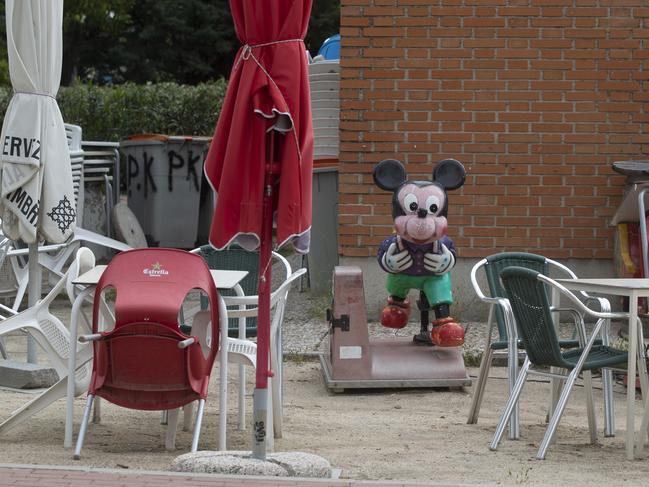
VIRUS PENETRATES HEART OF THE AMAZON
In the remote Amazon community of Betania, Tikuna tribe members suspect the coronavirus arrived this month after some returned from a two-hour boat trip down the Solimoes River to pick up their government benefit payments.
Dozens subsequently got headaches, fevers and coughs. Two died. And the five government medical workers for the community of about 4000 are not treating the sick because they lack protective equipment and coronavirus tests, said Sinesio Tikuna, a village leader.
So the Tikuna rely on their traditional remedy for respiratory ailments: Inhaling clouds of smoke from burning medicinal plants and beehives.
The Tikuna’s plight illustrates the danger from the coronavirus as it spreads to rainforest areas where tribe members live in close quarters with limited medical services. Most are reachable only by boat or small aircraft. “We’re very worried, mainly because help isn’t arriving,” Sinesio Tikuna said in a telephone interview.
Brazil has Latin America’s highest COVID-19 death toll, with more than 15,000 as of Sunday. The country’s hardest hit major city per capita is in the Amazon - Manaus, where mass graves are filling up with bodies.
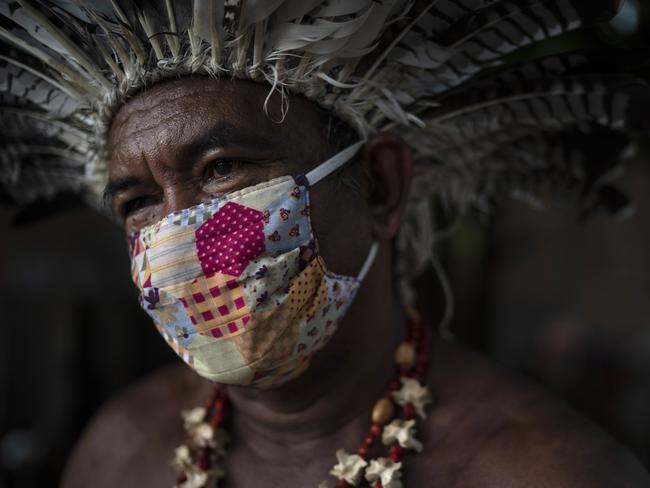
The indigenous people dwelling up the Solimoes and Negro rivers that merge in Manaus to form the Amazon River tried for weeks to seal their reserves off from the virus, pleading for donations while awaiting government deliveries of food so they could remain isolated. It didn’t come for many, indigenous advocates said.
The Upper Solimoes basin has 44 tribal reserves and has emerged as the Brazilian Amazon’s indigenous infection hotspot. Testing is extremely limited, but shows that at least 162 of the area’s approximately 76,000 indigenous people have been infected and 11 have died. There are more than 2000 confirmed infections in parts of the area not overseen by the government’s indigenous health care provider.
In a Tikuna village named Umariacu near the border with Peru and Colombia, the first three COVID-19 deaths were elderly tribe members infected by younger members who left town to receive government welfare payments and trade fish and produce for chicken and other food.
A co-ordinator of the region’s indigenous health care says a field hospital is needed as fast as possible, and if not, the effect on the local population could be catastrophic.
